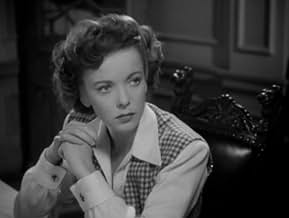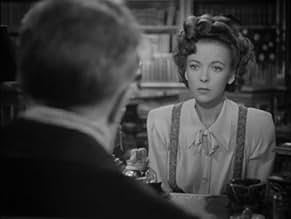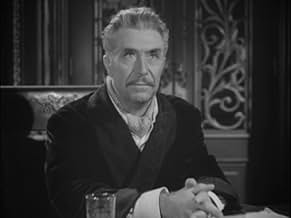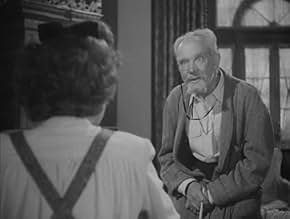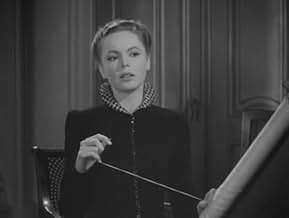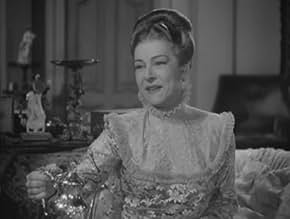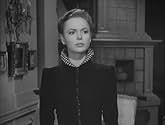Füge eine Handlung in deiner Sprache hinzuA young woman traveling to Poland with her employer meets a count, and they fall in love as World War II begins.A young woman traveling to Poland with her employer meets a count, and they fall in love as World War II begins.A young woman traveling to Poland with her employer meets a count, and they fall in love as World War II begins.
- Regie
- Drehbuch
- Hauptbesetzung
Alla Nazimova
- Zofia Orwid
- (as Nazimova)
Harry Adams
- Ballet Attendee
- (Nicht genannt)
Alex Akimoff
- Wine Seller
- (Nicht genannt)
Sylvia Arslan
- Naneczka
- (Nicht genannt)
Lynn Baggett
- Friend of Count Orvid
- (Nicht genannt)
George Blagoi
- Polish Peasant
- (Nicht genannt)
John Bleifer
- Wladek
- (Nicht genannt)
Paul Bradley
- Ballet Attendee
- (Nicht genannt)
Cyd Charisse
- Ballerina
- (Nicht genannt)
Gino Corrado
- Peasant at Party
- (Nicht genannt)
- …
Julius Cramer
- Polish Diplomat
- (Nicht genannt)
Jane Crowley
- Party Guest
- (Nicht genannt)
Empfohlene Bewertungen
Vincent Sherman's "In Our Time" tries to do for Poland what "Mrs. Miniver" did for England: raise American awareness to the plight of a European nation besieged by the Nazis. Unfortunately, the film wanders all over the hack-writing map from romance to propaganda to social issues and loses its focus early on. Even the style of the film shifts from intimate drama to semi-documentary with voice-over narration to stirring morale booster complete with back-lit clouds and beams of inspirational light. Despite the varied styles, the movie seems to linger on far too long despite a running time of less than two hours. By the time that the requisite patriotic speech has been made, the music has risen to stirring proportions, and the march towards the sunset has begun, many viewers may already have tuned out.
The unconvincing story begins in an antique shop where Ida Lupino, the young companion of Mary Boland, an English antiques buyer, meets Paul Henreid, a Polish nobleman. Only those who have never seen a Hollywood film from the Golden Age will be surprised by the Romeo-and-Juliet romance that develops or by the obstacles that stand between the couple and eternal bliss. Class-conscious family, impending war, and stubborn peasants are only some of the roadblocks to those inspirational beams that beckon on the horizon.
Unfortunately, some first-class talent has been lavished on this less-than-classic film. Ida Lupino is the shy companion to an overbearing employer. Within two hours, she blossoms into an assertive woman who fully supports and inspires her husband in his idealistic pursuits. Paul Henreid, whose seductive eyes and voice won Bette Davis and Ingrid Bergman, works his magic on Lupino. Like his role in "Casablanca," Henreid's character is caught up in patriotic fervor and self-sacrifice. Both leads are excellent although they cannot overcome the messy script. Silent film star Alla Nazimova offers especially fine support as Henreid's aristocratic mother. However, while the cast often rises above the writing, "In Our Time" remains dated in its message. Considering what Poland endured under Communism after World War II, many of the film's inspirational lines about fighting for the future ring with irony. Despite the length, lapses, and inconsistencies, Lupino, Henreid, and Nazimova make "In Our Time" worth a viewing, but the film is hardly a repeatable experience.
The unconvincing story begins in an antique shop where Ida Lupino, the young companion of Mary Boland, an English antiques buyer, meets Paul Henreid, a Polish nobleman. Only those who have never seen a Hollywood film from the Golden Age will be surprised by the Romeo-and-Juliet romance that develops or by the obstacles that stand between the couple and eternal bliss. Class-conscious family, impending war, and stubborn peasants are only some of the roadblocks to those inspirational beams that beckon on the horizon.
Unfortunately, some first-class talent has been lavished on this less-than-classic film. Ida Lupino is the shy companion to an overbearing employer. Within two hours, she blossoms into an assertive woman who fully supports and inspires her husband in his idealistic pursuits. Paul Henreid, whose seductive eyes and voice won Bette Davis and Ingrid Bergman, works his magic on Lupino. Like his role in "Casablanca," Henreid's character is caught up in patriotic fervor and self-sacrifice. Both leads are excellent although they cannot overcome the messy script. Silent film star Alla Nazimova offers especially fine support as Henreid's aristocratic mother. However, while the cast often rises above the writing, "In Our Time" remains dated in its message. Considering what Poland endured under Communism after World War II, many of the film's inspirational lines about fighting for the future ring with irony. Despite the length, lapses, and inconsistencies, Lupino, Henreid, and Nazimova make "In Our Time" worth a viewing, but the film is hardly a repeatable experience.
IDA LUPINO is a British young woman visiting Poland and acting as a companion to MARY BOLAND, a wealthy woman fond of collecting antiques. At an antique shop, Ida runs into PAUL HENRIED, who thinks she works at the store. They meet and fall in love, and Ida discovers that he's a Polish count. He insists on showing her around Warsaw and in a few short days they fall in love and, although Ida has misgivings when she meets his family and fails to pass inspection, they do marry.
Then the Nazi invasion of Poland looms over the story for the second half of the film. The script is articulate and literate, dealing as it does with the aristocracy for the most part, but terribly slow-moving and Vincent Sherman's direction fails to give the script the pace it needs to maintain interest.
Ida plays a more rational and less intense creature than she usually does and gives an assured performance as the British girl who must adjust to her new husband and his family. NANCY COLEMAN is his regal, spoiled sister, NAZIMOVA is his party-loving mother, and VICTOR FRANCEN is Henried's wealthy uncle, a Count who keeps the family financially solvent.
But Poland is unable to avoid falling into Hitler's clutches and the story veers into more serious territory with the advent of war and the decision that Henried must make with regard to Poland under Nazi rule.
Summing up: A bit tedious at times, but interesting for the performances of Lupino, Henried, Coleman, Francen, Nazimova, Mary Boland and Franz Waxman's melodramatic score.
Then the Nazi invasion of Poland looms over the story for the second half of the film. The script is articulate and literate, dealing as it does with the aristocracy for the most part, but terribly slow-moving and Vincent Sherman's direction fails to give the script the pace it needs to maintain interest.
Ida plays a more rational and less intense creature than she usually does and gives an assured performance as the British girl who must adjust to her new husband and his family. NANCY COLEMAN is his regal, spoiled sister, NAZIMOVA is his party-loving mother, and VICTOR FRANCEN is Henried's wealthy uncle, a Count who keeps the family financially solvent.
But Poland is unable to avoid falling into Hitler's clutches and the story veers into more serious territory with the advent of war and the decision that Henried must make with regard to Poland under Nazi rule.
Summing up: A bit tedious at times, but interesting for the performances of Lupino, Henried, Coleman, Francen, Nazimova, Mary Boland and Franz Waxman's melodramatic score.
In Our Time English girl Ida Lupino goes traveling with a somewhat subdued
Mary Boland and meets up with a real honest to goodness count played by
Paul Henreid. It's a romance that develops between them and she becomes a
countess.
Henreid is the kind of guy rich girls married back in the day for the title. He has an estate that's tied up in debt. They have to modernize or go broke. But with war clouds on the horizon will they have a chance?
This film is a tribute to the resistance of the Polish people in much the same way Edge Of Darkness is to the Norwegians. It came to the attention of the House Un-American Activities Committee and its writer Hpward Koch made the blacklist.
When Ida Lupino talks about having the estate peasants share in the harvest and maybe bringing in tractors she runs into some bad reaction from Victor Francen the old mastodon head of the family. God made him an aristocrat and them peasants and as an aristorat he's entitled to the perks therein. All this talk about sharing and brotherhood got the HUAC investigators attention.
In the end there's a note of optimism as this film came out in 1944 and the tide of war had turned and the audience who saw In Our Time knew it. The collective cast members fates are left to your imagination.
This wartime film still holds up well even today as recent events show fasciam is very much alive in this world and in places Americans did not contemplate in 1944.
Henreid is the kind of guy rich girls married back in the day for the title. He has an estate that's tied up in debt. They have to modernize or go broke. But with war clouds on the horizon will they have a chance?
This film is a tribute to the resistance of the Polish people in much the same way Edge Of Darkness is to the Norwegians. It came to the attention of the House Un-American Activities Committee and its writer Hpward Koch made the blacklist.
When Ida Lupino talks about having the estate peasants share in the harvest and maybe bringing in tractors she runs into some bad reaction from Victor Francen the old mastodon head of the family. God made him an aristocrat and them peasants and as an aristorat he's entitled to the perks therein. All this talk about sharing and brotherhood got the HUAC investigators attention.
In the end there's a note of optimism as this film came out in 1944 and the tide of war had turned and the audience who saw In Our Time knew it. The collective cast members fates are left to your imagination.
This wartime film still holds up well even today as recent events show fasciam is very much alive in this world and in places Americans did not contemplate in 1944.
Stumbled onto this on TCM ... granted, it's a wartime film to be sure - down to the "Buy War Bonds" cleverly configured Warner Brothers credit at the end, and brimming with patriotic emotion - but incredibly enjoyable/entertaining. I was happily surprised by all the talent in the cast - besides the ALWAYS wonderful Ida Lupino and the wonderfully debonair/attractive Paul Henreid (sigh!), it was delightful to see - albeit briefly - Mary Boland (for an extensive Mary Boland treat, check her out in "The Women"). And the rarely-seen-on-screen Alla Nazimova was illuminating ... while I heard her name being mentioned by the host, I didn't put it together until afterward. Great WWII Western European homefront film - highly recommend it!
It is unusual to see a film made during the Second World War by Warner Bros. that deals with Poland, but here we have this seldom seen gem starring Ida Lupina and Paul Henreid. Lupino plays an English tourist in Warsaw on an antique buying mission when she falls in love with a Polish count, played sensitively by Henreid. They move to his estate and attempt to modernize the farm operations, but the German invasion of Poland throws their lives into turmoil.
Wusstest du schon
- WissenswertesCount Stefan takes Jennifer on a walking tour of Warsaw. As they walk, stock footage is shown of various important monuments, culminating in the bronze statue of Chopin by sculptor Waclaw Szymanowski. These monuments were all systematically destroyed by the Germans in 1940.
- PatzerAt the ballet, Count Stefan and others in his box use the opera glasses to look down at Jennifer in the audience below. The first shot through the glasses shows her not looking straight up at Count Stefan, but to her right, even though they have acknowledged each other. In subsequent shots through the glasses, the perspectives are far too low and to the front of Jennifer to be from the box above.
- Zitate
Count Pawel Orwid: [at the ballet] Stefan, when I was a young man, I came for the ballerinas. Later on I came for the music. Now I come to sit.
- Crazy CreditsAfter the WB logo appears at the end, the letters W and B are separated and letters added to form the words "BUY War Bonds".
- VerbindungenFeatured in Frances Farmer Presents: In Our Time (1959)
- SoundtracksPolonaise in A major, Op.40, No.1 ('Military')
(1838-39) (uncredited)
Written by Frédéric Chopin
Partially played during the opening credits and at the end
Variation in the score throughout
Played on a radio to signal that Warsaw is still fighting
Top-Auswahl
Melde dich zum Bewerten an und greife auf die Watchlist für personalisierte Empfehlungen zu.
Details
- Erscheinungsdatum
- Herkunftsland
- Sprache
- Auch bekannt als
- Aşk milyona bedel
- Drehorte
- Produktionsfirma
- Weitere beteiligte Unternehmen bei IMDbPro anzeigen
- Laufzeit1 Stunde 50 Minuten
- Farbe
- Seitenverhältnis
- 1.37 : 1
Zu dieser Seite beitragen
Bearbeitung vorschlagen oder fehlenden Inhalt hinzufügen

